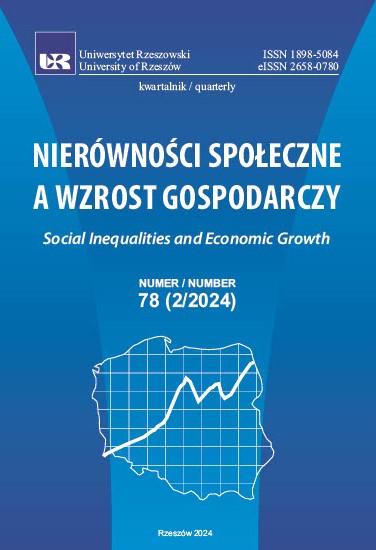Barriers to the development of the digital economy in Poland
DOI:
https://doi.org/10.15584/nsawg.2024.2.5Keywords:
digital economy, barriers to the development of the digital economy, digital competences, digital exclusionAbstract
The phenomenon of digitisation of the economy is becoming more and more common and this trend is expected to intensify. There is no doubt that new technologies and digitalisation have and will continue to influence many areas of life, including how people perform work, communicate, conduct business, and conduct financial transactions. The universality of this phenomenon, however, does not mean that all members of society will become equal beneficiaries of the changes taking place. The study period covers 2018–2022. The aim of the work is to attempt to assess the digital potential of the Polish economy and to identify development barriers of the digital economy in Poland. To achieve the chosen goal, the following research methods were used: review of the subject literature, presentation and analysis of source materials, and critical analysis. The research hypothesis is: the pace of changes in the construction of the digital economy in Poland is too slow. In the context of actions taken to build a digital economy, Poland has improved indicators showing the level of development of technical infrastructure and public digital services, and the level of basic digital competences of Poles has also increased. However, in areas such as the number of ICT specialists, the level of post-basic digital skills and the use of AI in companies, it has achieved much weaker progress. Ignorance or insufficient proficiency in acquiring and using the opportunities offered by information and communication technologies will prevent full participation in the digital world for entities that, without acquiring and improving digital competences, may be excluded from the digital world of modern technologies. Employers operating in a highly competitive environment should be interested in filling gaps in employee skills that are necessary from the point of view of the company’s interests, including by organising and/or financing necessary training. Nowadays, in the era of the information society, access to digital technologies and the ability to use them are a key factor determining the quality and standard of life and are an indicator of socio-professional position.
Downloads
References
Bartczak, K. (2016). Bariery rozwojowe handlu elektronicznego. Wrocław: Exante.
Bartol, A., Herbst, J., Pierścińska, A. (2021).Wykluczenie społeczno-cyfrowe w Polsce. Stan zjawiska, trendy, rekomendacje. Fundacja Stocznia. Pobrane z: https://fundacja.orange.pl/app/uploads/2021/11/RAPORT_WYKLUCZENIE-SPOLECZNO-CYFROWE-W-POLSCE_2021.pdf (2024.03.25).
Boratyńska, K., Cieślik, E., Kacperska, E., Łukasiewicz, K., Milewska, A. (2021). Gospodarka cyfrowa we współczesnym świecie – kraje V4. Warszawa: Wydawnictwo SGGW.
Chądrzyński, M., Gruziel, K., Kacperska, E., Klusek, T., Utzig, M. (2021). Polska w dobie cyfryzacji. Warszawa: Wydawnictwo SGGW.
Digital Poland. (2022). Czas na cyfrową gospodarkę. 3 edycja. Warszawa: Digital Poland.
van Dijk, J. (2010). Społeczne aspekty nowych mediów. Warszawa: Wydawnictwo Naukowe PWN.
Grynia, A. (2022). Cyfryzacja jako determinanta międzynarodowej konkurencyjności gospodarki. Przypadek krajów Europy Środkowo-Wschodniej. Optimum. Economic Studies, 4(110), 17–31. DOI: 10.15290/oes.2022.04.110.02
GUS. (2021). Wykorzystanie technologii informacyjno-komunikacyjnych w jednostkach administracji publicznej, przedsiębiorstwach i gospodarstwach domowych w 2020 roku. Warszawa: GUS.
Jabłoński, M., Jabłoński, A., Szpitter, A. (2020). Dynamika modeli biznesu przedsiębiorstw w gospodarce cyfrowej – perspektywa fonetyzacji. W: S. Gregorczyk, G. Urbanek (red.), Zarządzanie strategiczne w dobie cyfrowej gospodarki sieciowej (s. 9–15). Łódź: Wydawnictwo Uniwersytetu Łódzkiego.
Luka w umiejętnościach cyfrowych to kolejne wyzwanie dla polskich firm. Fundacja Digital Poland. Pobrane z: https://businessinsider.com.pl/technologie/digital-poland/luka-w-umiejetnosciach-ery-cyfrowej/jcjpexb (2024.03.25).
Majos, A., Włoch, R. (2015). Bezrobotni w świecie cyfrowych technologii. Pobrane z: https://www.delab.uw.edu.pl/wp-content/uploads/2015/12/zam-1401-DELAB-raport-internet-22.12-1.pdf (2024.03.22).
Pieriegud, J. (2016). Istota cyfryzacji oraz transformacji cyfrowej. W: J. Gajewski, W. Paprocki, J. Pieriegud (red.), Cyfryzacja gospodarki i społeczeństwa – szanse i wyzwa¬nia dla sektorów infrastrukturalnych (s. 11–38). Gdańsk: Publikacja Europejskiego Kongresu Finansowego.
Poland in the Digital Economy and Society Index. Pobrane z: https://digital-strategy.ec.europa.eu/en/policies/desi-poland (2023.10.29).
Polska jako Cyfrowy Challenger. Podsumowanie wyników raportu dla Polski. Pobrane z: https://www.mckinsey.com/pl/~/media/mckinsey/locations/europe%20and%20mid-dle%20east/polska/raporty/digital%20challengers%203/polska%20jako%20cyfro-wy%20challenger_digital%20challengers.pdf (2024.03.12).
Radomska, E. (2019). Rozwój gospodarki cyfrowej i społeczeństwa cyfrowego w aspekcie dynamicznych zmian w otoczeniu zewnętrznym na przykładzie Wielkiej Brytanii. Myśl Ekonomiczna i Polityczna, 1(64), 113–146. DOI: 10.26399/meip.1(64).2019.05/e.radomska
Smulski, J. (2020). Rynek IT i telekomunikacji w Polsce. Szanse, zagrożenia, bariery rozwoju. Raport PIIT. Pobrane z: https://piit.org.pl/wp-content/uploads/2023/11/Raport-PIIT_Rynek-IT-i-Telekomunikacji-w-Polsce_23072020.pdf (2021.10.09).
Społeczeństwo informacyjne w Polsce w 2023 roku. Pobrane z: https://stat.gov.pl/obszary-tematyczne/nauka-i-technika-spoleczenstwo-informacyjne/spoleczenstwo-informacyjne/spoleczenstwo-informacyjne-w-polsce-w-2023-roku,2,13.html (2024.03.05).
OECD. (2021). Understanding the Digital Divide. Pobrane z: http://www.oecd.org/dataoecd/38/57/1888451.pdf (2024.03.11).
UN E-government Knowledgedatabase. Pobrane z: https://publicadministration.un.org/egovkb/en-us/Data/Country-Information/id/135-Poland/dataYear/2022 (2024.03.18).
Verhoef, P.C., Broekhuizen, T., Bart, Y., Bhattacharya, A., Qi Dong, J., Fabian, N., Haenlein, M. (2021). Digital Transformation: A Multidisciplinary Reflection and Research Agenda. Journal of Business Research, 122, 889–901. DOI: 10.1016/j.jbusres.2019.09.022
https://www.statista.com/statistics/421580/egdi-e-government-development-index-ranking/ (2024.03.05).
Downloads
Published
How to Cite
Issue
Section
License
Copyright (c) 2024 University of Rzeszow

This work is licensed under a Creative Commons Attribution-NonCommercial-NoDerivatives 4.0 International License.


